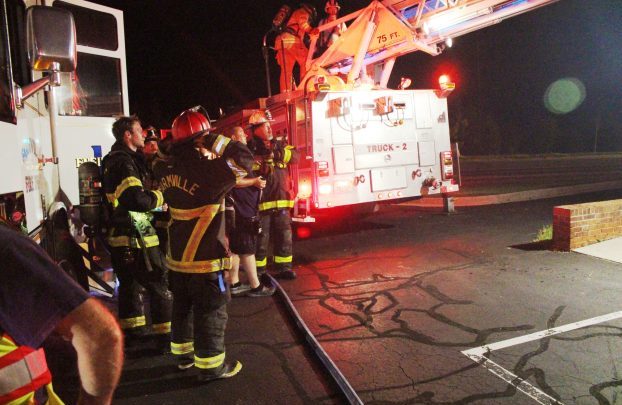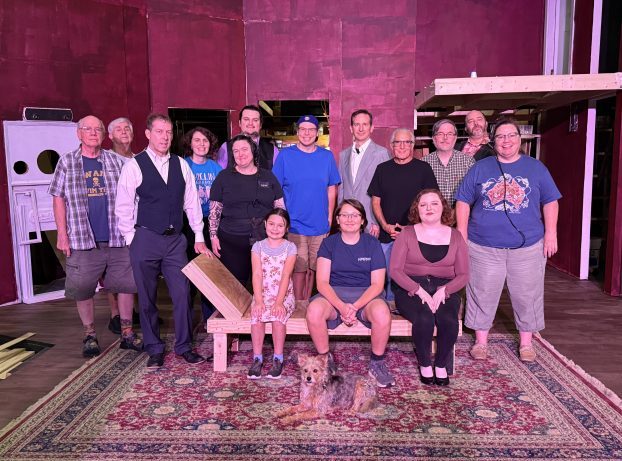Are Buckingham gold deposits worth mining? It’s questionable
Published 1:20 am Friday, March 31, 2023
|
Getting your Trinity Audio player ready...
|
DILLWYN – Yes, there are gold deposits in Buckingham County. And yes, it would be possible to mine those areas. But the problem, according to Paul Busch, involves cost.
“There are no deposits in the state of Virginia big enough to be (profitable),” said Busch. He owns Big Dawg Resources and runs a gold mine in Goochland County. The Buckingham County resident works to remine the metals left behind in abandoned mines and clean up the sites. That includes removing mercury contamination on the sites, reclaiming the shafts and removing underground timbers that have been leaching creosote into the groundwater.
Busch said there’s just not enough gold, in Buckingham County or anywhere else in the state, to make the effort worthwhile.
Trending
“The state of Virginia has been exploratory drilled up, down, left, right and sideways,” Busch said. “If (a big gold deposit) was here, they would have found it.”
Busch had been called as an expert to the Buckingham County Planning Commission. Speaking in a planning commission meeting on Monday, March 27, he said it’s not about the quality, it’s about the quantity.
“Really good deposits like what Aston Bay has found, has been found before,” Busch said. “The quantity is just not there. Virginia has veins. We don’t have big ore bodies underground. Yes, the gold in that vein is phenomenal, but it’s 400 feet deep.”
Busch gave an example. Take an Olympic-sized swimming pool, he said, drain it and put a $100 bill at the bottom. Then fill the whole thing with dirt. Now follow regulations and only search for that $100 by coming in at a 45 degree angle from all four sides.
“Would you dig to that $100?” Busch asked. “I hope not, because you would lose money.”
What gold deposits exist in Buckingham?
Yes, a gold deposit does exist in Buckingham County. In April 2019, the Canadian prospecting company Aston Bay Holdings announced they were beginning to search for gold in the area.
Trending
To be clear, Aston Bay isn’t a mining company. It’s a prospecting company. That means they search for gold deposits, silver or other minerals, identify and purchase a location, then sell that information (and property) to the highest bidder.
They can do this because under Virginia law, prospecting doesn’t require a state permit if you’re searching for anything other than uranium.
In statements given in March 2019 and July 2020, company officials declared their drilling confirmed a “a high-grade, at-surface gold vein system at Buckingham, as well as an adjacent wider zone of lower-grade disseminated gold mineralization.” In other words, they found enough to keep going. At the beginning of 2020, the company secured the right to prospect on 4,953 acres of land in Buckingham County.
As for a timeline on when work might be finished, first it has to be restarted. The company hasn’t done any work in Buckingham since early 2020.
“We have conducted only preliminary exploratory drilling on the local landowners’ properties at Buckingham, and none for the past two years,” Aston Bay CEO Thomas Ullrich told The Herald earlier this year. “We have several quality potential projects, but a limited amount of funds. Over the last year and a half, we have been investing in the landowners in another county. We look forward to investing in Buckingham again.”
What would it take?
One of the big questions the commission had involved the future. Ok, gold isn’t profitable enough now to mine in Virginia, but what about later on? Busch said it would likely need to be about $5,000 per ounce. As of Wednesday, March 29, gold was selling at $1,970 per ounce.
“You’d (need) to be pretty close to ($5,000),” Busch said. “It would definitely have to more than double where (the price) is now.”
Bush also was asked about and discussed an alternative to the county’s current proposal. In February, Buckingham supervisors put together a proposal to eliminate metallic mining as an allowed land use across the county. But that’s not something supervisors can just approve. First, it had to go before the planning commission. And over the last month, planning commission members have gone through a series of hearings, collecting information about the subject.
Mineral mining operations in Buckingham warned that due to a lack of state guidelines, if Buckingham closed all metallic mining, other companies could also be at risk. Planning commission member Danny Allen had proposed another option, to ban the chemicals involved, instead of trying to shut down all metallic mining itself. Busch said while he wasn’t necessarily in favor of any ban, a process block made the most sense.
“Ban the cyanidation process,” Busch said. “Nobody’s going to use it anyway. We don’t have the deposits for it.”
By that he’s referring to the size of the gold deposits. Cyanide is only used on small deposits and the ones found in Buckingham are too large for that procedure to apply. By banning the process by which cyanide is used, you don’t ban the chemical itself, which is used in everything from pesticides to herbicides and cigarette smoke.
“Just ban the process,” Busch suggested. ‘That’s probably the easiest solution to the whole thing.”
What happens next?
There will at least be one more planning commission hearing on gold mining, this time with some experts opposed to mining. This next meeting will be held Wednesday, April 19, at 6 p.m.







